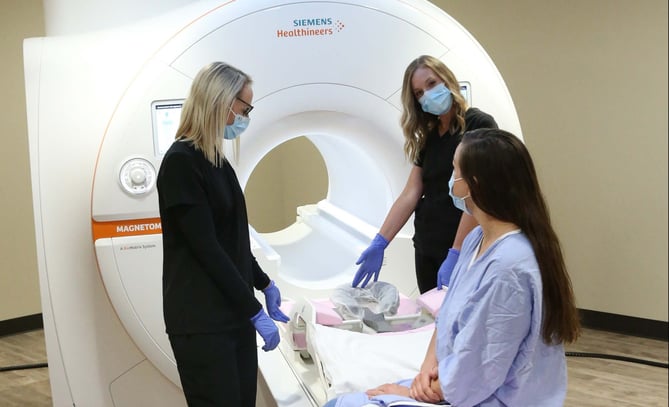
Although an MRI is a painless, noninvasive, and safe procedure, the prospect of getting one can evoke a great deal of stress in the millions of people who suffer acute anxiety in closed spaces. When not properly accommodated during an MRI, claustrophobic patients may experience panic attacks, which can bring on increased heart rate, difficulty breathing, chills, sweating, and other distressing symptoms.
Claustrophobia is a very common condition, affecting as much as 5% of the population. If you know that you are claustrophobic or prone to panic attacks, discuss the issue with your health care provider ahead of time. Planning ahead in this way will enable the imaging professionals and your doctors to work together to provide all available tools to make your procedure as comfortable as possible. Here are five things that can help ease anxiety and make it easier to get through an MRI.
1. Information
Even for patients who don’t suffer from claustrophobia or panic attacks, diagnostic procedures can provoke a great deal of anxiety. Often, simply having a number of unanswered questions can be overwhelming and create a lot of unnecessary stress. If this is the case, make a list of all the questions that are on your mind, and either call your provider’s office or bring your list with you to an upcoming appointment. Don’t hesitate to ask new questions as they arise. Providing clear answers to your questions is an essential part of quality, patient-centered health care.
2. Basic Comfort Measures
Experienced radiologic technologists have worked with many anxious patients and can often provide basic comforts to help you complete a needed imaging exam. Blankets can be used to help make positioning more comfortable as well as keep you warm and cozy. Headsets can help to drown out the noise of the MRI machine and allow you to listen to your favorite music, nature sounds, guided meditation, or whatever you find most relaxing. You may also be able to arrange to have a family member in the room with you during the procedure. Be sure to ask the imaging provider ahead of time if this accommodation will be possible.
3. Meditation or Breath Focus
Giving your mind something else to do can help prevent you from focusing on feelings of being restrained. If you already have a meditation practice, this is a prime opportunity to use it. If not, there are some simple things you can do to calm your body and mind.
Count your breath.
At certain points during your MRI, the technologist may ask you to hold your breath. The rest of the time, breath counting can be a helpful calming tool. Start counting in a steady rhythm as you inhale (1, 2, 3,…), and notice what number you reach. Start counting again as you exhale, and see if you can make the exhale one or two counts longer. If it’s comfortable for you, linger for a second or two after the exhale before inhaling. This both gives your mind a focus and encourages you to elongate your exhale, which helps to calm the stress response.
Practice grounding techniques.
Grounding is a practice of anchoring yourself in the present, which can help pull you back if your mind starts spinning out anxious thoughts. A body scan is one example of a grounding technique that can be used while undergoing MRI. Bring all of your attention to one part of your body (for example, the top of your head, your left big toe, or your right hand thumb). Take time to observe how that part feels. Move your attention through your body, from one part to the next, trying to maintain your focus as you go. When you notice your attention wandering (and you probably will), just bring it back as you’re able. Simply making the effort to remain focused in your body can help minimize unwanted thoughts.
Use a guided meditation or relaxing music.
Many imaging providers make headphones available so you can listen to music or guided meditation. Call in advance to ask what options you have. Iowa Radiology gives patients access to the Pandora app, which includes channels for guided meditations and just about any kind of music.
4. Wide-Bore MRI
Not all MRI machines are the same. If you’re concerned that your MRI will feel too confining, ask about accessing a wide-bore machine. Wide-bore MRI machines feature openings that are 20% larger than closed-bore machines, and they’re significantly quieter. The wide-bore MRI has an ultra short core, which provides a more open feeling similar to a CT exam, and allows more than 80% of exams to be performed feet first. Due to the strength of its magnet, the wide-bore machine can also enable quicker, more accurate scans so you can get out of there sooner without sacrificing image quality.
5. Medication
If you need additional support for your anxiety, your referring provider may prescribe a benzodiazepine to take prior to the exam. Benzodiazepines are a class of drugs commonly prescribed to treat anxiety and can typically relax an anxious patient enough to complete an MRI. If you will be taking a benzodiazepine, be sure to have someone ready to drive you home after your exam.
If you suffer from extreme claustrophobia or severe pain that could prevent you from completing your MRI, and if you’re over 18 years old and in good health, your doctor may recommend intravenous (IV) conscious sedation. Some patients are not appropriate candidates for this intervention, including those who use CPAP machines to treat of sleep apnea, are morbidly obese, or who have uncontrolled COPD, emphysema, lung and/or heart disease. Those who receive intravenous sedation must be closely monitored to ensure medical personnel can quickly respond to any adverse reaction.
Speak with your doctor well ahead of time if you think you may need medication to complete your MRI. Often, patients must have a current physical and medical history performed within 30 days prior to the procedure to ensure safety, and the exam must be medically necessary.
Iowa Radiology performs a wide range of state-of-the-art imaging exams, including MRI. Our staff is dedicated to excellent patient care and is adept at helping our patients feel as comfortable as possible during their visits. For more information about MRI exams, click the links below to access our complimentary resources.


